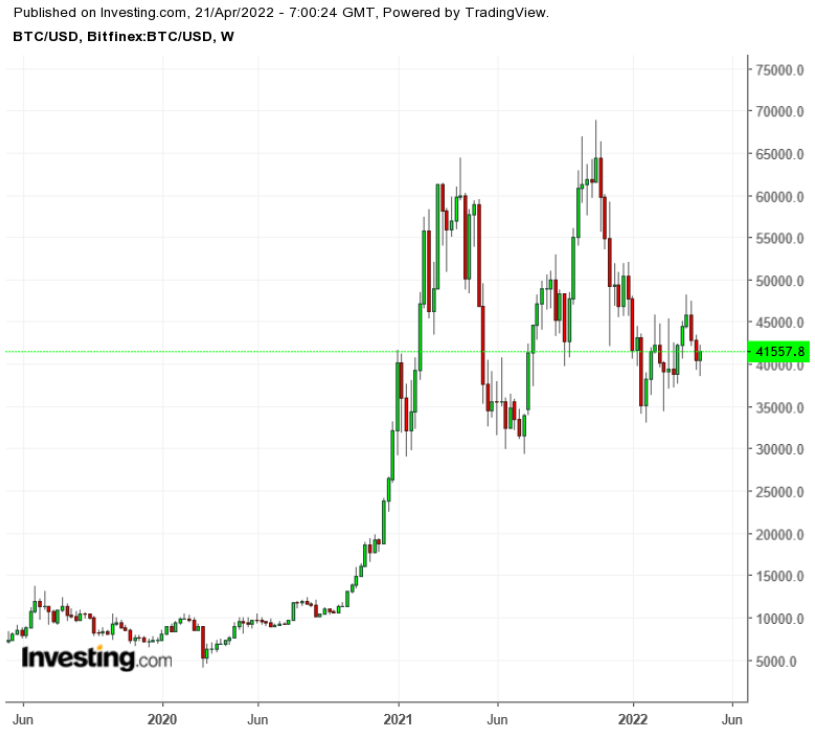This article was written exclusively for Investing.com
- Old school versus new school investing
- Warren Buffet and his partner have not been shy about their opinion of cryptocurrencies
- Peter Thiel, new school entrepreneur, thinks differently
- Thiel takes aim, puts Buffet in his crosshairs
- Thiel vs Buffet reflects ongoing debate over evolution of the fintech revolution
In 2010, when a colleague first told me about Bitcoin, my initial reaction was to dismiss the tokens as a video game, much like Pacman, Asteroids, and Pong which I'd played in college. The model for the cryptocurrency, with its blockchain technology, seemed like those amusement parks and arcade games where you earned tokens or tickets for games played in order to collect a handful of useless rewards like toys or stuffed animals.
Other, seemingly more important commitments at the time prevented me from properly investing Bitcoin and Blockchain, the innovative building blocks of a budding technological revolution in finance. Though I'd always put more faith in gold and silver because of my lack of faith in fiat currencies, I didn't initially make the connection with cryptos.
By the time I experienced my ah-ha moment vis-à-vis digital currencies, Bitcoin had moved from under $1 to over $100 per token and I assumed, clearly incorrectly, it was too late to get in on the trading. Meanwhile, Blockchain is changing the world of finance and Bitcoin has spawned over 18,750 other cryptos.
The incredible rally that took Bitcoin to nearly $70,000 per token in November 2021 fueled a speculative frenzy for the entire asset class, making it the most volatile market I have ever watched.

As such, the assets can be highly risky but the utility case remains extremely attractive.
Within the world of finance, which many believe stands to benefit from this fintech innovation, there's been a bifurcation of opinion, with some prominent investors embracing cryptocurrencies, while others have harshly rejected the burgeoning asset class.
In early April, at a cryptocurrency conference in Miami, Florida, the two camps collided as one high-profile supporter took aim at a high-profile opponent.
Old school versus new school investing
Benjamin Graham, the father of value investing, in 1934, co-authored a classic book, Securities Analysis, that became a must-read for stock market analysts and portfolio managers. In 1949, Graham published The Intelligent Investor which was revised for each new generation of investors until three years before Graham passed away in 1976. The books are considered the founding texts on classical value investing.
In chapter four of the second book, Graham wrote:
“We have suggested as a fundamental guiding rule that the investor should never have less than 25% or more than 75% of his funds in common stocks, with the consequent inverse range of between 75% and 25% in bonds.”
Some of the most successful value investors continue to hail Graham as their teacher and his principles as their inspiration.
But new school investing—embraced by such wealthy iconoclast entrepreneurs and company founders as Elon Musk, Jeff Bezos, Jack Dorsey, and Mark Zuckerberg, people who made their fortunes via recent technological innovation—has taken hold along with the new technology. It's a philosophy that often embraces out-of-the-box thinking, and different guidelines for portfolio building and asset allocation.
Warren Buffet and his partner have not been shy about their opinion of cryptocurrencies
When discussing old-school investors, Warren Buffett, CEO of Berkshire Hathaway (NYSE:BRKa) and his partner, the company's Vice Chair Charlie Munger are often mentioned. Buffett and Munger are also synonymous with value investing; no surprise, their mentor was Benjamin Graham.
Of course, Graham passed away long before cryptocurrencies exploded as an asset class. Though Graham didn't live to see this new means of exchange, Munger and Buffett did, and each has very strong opinions about the new asset class.
What these old school investors note is that cryptocurrencies, unlike fiat currencies such as the dollar, pound or euro, which have the backing of national governments, derive their value solely from the marketplace. Bids and offers establish those values without government intervention. At the same time, governments routinely buy and sell fiat currencies to provide market stability for their legal tender.
Thus, Buffett once called cryptocurrencies “rat poison squared.” Munger went even further. He said they're a “venereal disease” and “disgusting and contrary to the interests of civilization.”
Other value investors believe cryptos are a fad, not unlike the tulip bulb craze that occurred in the Netherlands during the 1600s.
Peter Thiel, new school entrepreneur, thinks differently
Peter Thiel is a billionaire entrepreneur, venture capitalist, and political activist. He made his fortune as a co-founder of payment platform PayPal (NASDAQ:PYPL); the software infrastructure tech company Palantir Technologies (NYSE:PLTR); and via his venture firm Founders Fund, which reportedly has amassed hundreds of millions of dollars worth of Bitcoin.
Thiel was also the first outside investor in Facebook, now called Meta Platforms (NASDAQ:FB). He's arguably the consummate new school investor who made billions during the technological revolution.
Politically, Thiel is a libertarian. As such, the cryptocurrency ideology reflects his politics. Cryptos remove control of the money supply from governments and return it to individuals.
In October 2021, he said he felt underinvested in Bitcoin when the price of the token moved above the $60,000 level.
Thiel takes aim, puts Buffet in his crosshairs
On Apr. 8, at the previously mentioned Bitcoin conference, Thiel presented a slide show that included criticism of financial opinion leaders he accused of trying to stop cryptocurrencies.
He called Buffett “a sociopathic grandpa from Omaha.” He also took aim at Jamie Dimon, CEO of global investment bank JPMorgan Chase (NYSE:JPM), and Larry Fink, the CEO of BlackRock (NYSE:BLK), plus other cryptocurrency critics. However, he called Buffett Bitcoin’s “Enemy No. 1.”
Thiel positioned himself as the spokesman for the new school of investing, labeling Buffett, Diamond, Fink, and other cryptocurrency critics as the poster boys for the old and, in his opinion, outdated investing school, referring to them as the 'gerontocracy.'
Thiel vs Buffet reflects ongoing debate over evolution of the fintech revolution
This debate over the value of cryptocurrencies will no doubt continue as it perfectly illustrates the investing philosophy of the old versus the new guard in finance and economics, representing as well traditional capitalism vs libertarianism.
Like Peter Thiel, Elon Musk, the world's wealthiest person, is a crypto enthusiast. Perhaps not so coincidentally, Thiel and Musk were partners and co-founders of PayPal, the payments company that created an electronic alternative to traditional paper payment methods.
In 2020, well before Thiel’s public tirade aimed at Buffet, Musk said, “We should have fewer people doing law and fewer people doing finance” alluding to Buffett “and more people making stuff.”
Still, it pays to note that the market cap of the entire cryptocurrency asset class, as of Apr. 19, stood at the $1.931 trillion level with Bitcoin and Ethereum, the two leaders, reflecting over 60% of that value. That market cap does not yet represent even a tiny systemic risk to equities, Buffett et al's favored investment venue. Apple (NASDAQ:AAPL), the world’s most valuable company, has a market cap of around $2.7 trillion at the $167.23 share level as of Wednesday's close.
Nevertheless, cryptos have a wealthy and influential base of supporters and detractors. The larger the market cap of the burgeoning asset class grows, the fiercer the rhetoric around the disagreement will likely become. Yet for all the speculative frenzy cryptocurrency rallies may trigger, their utility and challenge to traditional finance and government control of the money supply are the real heart of a political and economic ideological debate that likely also has its provenance in old versus new school ideology.
